-
PARADOX (Wilson Yip 2017)
WILSON YIP: PARADOX (2017)
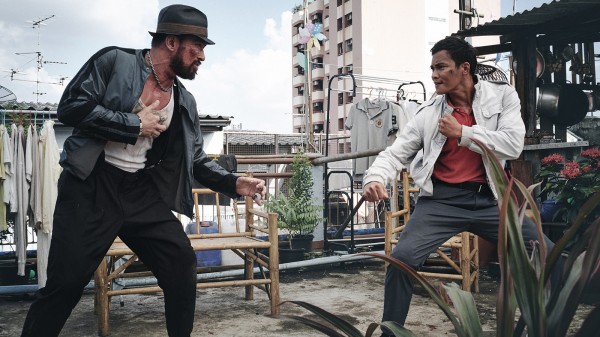
CHRIS COLLINS AND LOUIS KOO IN PARADOX
A trip to Thailand
Paradox is as adept as many other Hong Kong action movies, including the two previous of the 'SPL' franchise to which it is linked. This one takes us from Hong Kong to a new location and a kidnapping for very nefarious purposes. The themes of pregnant daughters and organ theft are interwoven in a pretty disturbing way. But they're there not so much for any depth of exploration as to function as engines for action requiring a variety of bad guys and some frenetic running around.
At the center is Hong Kong cop Lee Chung-Chi (the handsome and buff and newly martial-arts-ready Louis Koo). His teenaged daughter Wing-Chi (Hanna Chan) brings the unwelcome news that she's pregnant by some uneducated stranger she wants to marry now. Rather than blessing this union, Lee gets the boy arrested, and this leads Wing-Chi to flee to Thailand, where's she's kidnapped by organ thieves to provide a heart transplant for the aging and ailing mayor of Bangkok seeking reelection. Given that his brutality has set off the fate of his daughter, the heroic Lee isn't so heroic after all, an aspect that might have made for richer treatment than it gets here.
The mayor and his breathtakingly unscrupulous manager Cheng Hon-Sau (Gordon Lam) provide one subplot. The organ theft kingpin, a burly and crude American called Sacha (Chris Collins) whose cover is a meatpacking plant, is the other. Lee links up with local cops Chui Kit (Wu Yue) - whose wife is pregnant (another, parallel, subplot) and ranking officer Chai (Vithaya Pansringarm) - a little too close to local government bosses to be honest. They are joined, all too briefly, by the acrobatic Thai martial arts star Tony Jaa, as a another local cop. As Lee pursues his search sometimes with fellow cops, sometimes on his own, he's occasionally also helped by a good-hearted hooker (Jacky Cai).
If a righteous, vengeful cop wiping out a horde of bad guys in a warehouse is your thing Paradox will be all you need. The action sequences are relentless and hyper-active. The scenery is pretty. The bad guys are really bad. But there isn't enough complexity to the plot to make this stand out from so many Hong Kong action movies with cops and bad guys. The local industry is shown by this festival selection to be producing this genre as well as ever, but it becomes ever harder to bring out a truly original one.
If Paradox stands out from its peers, it could be for the preponderance of brutal hand-to-hand combat, which includes a wealth of knife-cuts and spurting blood, all executed with precision and clarity. A man listening to a beating heart may be the most memorable image, however. Sammo Hung was in charge of the fight choreography. The work of dp Kenny Tse is impeccable. The writing of Nick Cheuk and Lai-Yin Leung could have been more plausible. For a convincing tale of organ theft, go to Stephen Frears' 2002 Dirty Pretty Things , or for a truly great film about a dicey heart transplant, watch Claire Denis' 2004 L'intrus/The Intruder.
Paradox / 殺破狼・貪狼 (Sha po lang: taam long, "The Killing Wolf"), 98 mins., opened in China, Singapore, Hong Kong, Taiwan and Thailand in Aug.-Oct. 2017, showing at San Diego and Taipei Nov., releasing i South Korea and Japan in 2018. Screened for this review as part of NYAFF, showing 4 Jul, 2018 at 7:45 p.m.
Reviewed in Hollywood Reporter and Screen Anarchy .
Last edited by Chris Knipp; 07-03-2018 at 12:25 AM.
-
HIT THE NIGHT (Jeong Ga-young 2017)
JEONG GA-YOUNG: HIT THE NIGHT (2017)
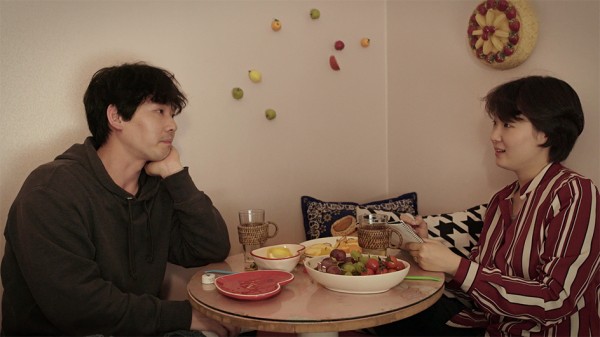
PARK JONG-HWAN AND JEONG GA-YOUNG IN HIG THE NIGHT
Boy hunting in the rough
Jeong Ga-young is most known in Korea as an actress, but as she turns to directing as well, she invites the description of "female Hong Sang-soo" with this film consisting, like Hong's, of long scenes of talking and drinking. This variation lacks the polish or the charm of Hong, but in its relative crudeness and its flipping of the gender roles, it may have more bite.
An aspiring female director, also called Ga-young and played by Jeong, seeks to seduce male acquaintance Jin-nyeok (Park Jong-hwan) through a lengthy, provocative interview, ostensibly conducted as parparation for a film (she takes notes). Ga-young delves into Jin-nyeok's love-life over a night of drinking. Jeong is small, with short hair. Jin-nyeok is tall, with bushy, boyish hair (Park has worked as a fashion model). Jeong started as a director with the 2016 Bitch on the Beach, which references Hong Sang-soo directly. This Ga-young is neither subtle nor romantic, starting right out with questions about how many times Jin-nyeok masturbates, whether he thinks of his girlfriend as he does so, and so on. Jin-nyeok is a sufficiently complex (and understated) personality to make the outcome uncertain.
Jin-nyeok may be the boy of Ga-young's dreams, and at least she hints that she's interested, but he repeatedly says that he isn't. Given her laughably inappropriate approach, that's no surprise. We also understand that she is paying him for this "interview," though its purpose as preparation for a film seems dubious. On the other hand, Jin-nyeok doesn't walk away.
The evening starts with dinner, then moves on to drinks, and ends with karaoke. The drinking they do at a kind of club with booths. When Jin-nyeok goes to the bathroom, he has a hard time remembering which booth they were in. At the Karaoke club, a plump, bespectacled friend of Jin-nyeok's appears. She goes walking with this new guy,who unlike Jin-nyeok, is quite willing to kiss her. They seem to hit it off. But she won't allow him to accompany her home. She calls back Jin-nyeok, saying the interview wasn't over, and there is more conversation, unsatisfying for her.
There is discussion of a film Ga-young made or wanted to make, a sort of knockoff of Park Chan-wook'sOldboy, and uncertainty about the ending. And so Jeong prepares us for the non-ending of this film, with Ga-young alone, back at her apartment, sitting at a desk.
As one who has watched with pleasure a dozen or so of Hong Sang-soo's prolific output, it was natural to be curious about a female version, but I was somewhat disappointed, since this movie not only lacks the fluency and sparkle of Hong, but also Jeong, as an actress, is blatantly no match for the beauty and vivacity of Hong's current muse, Kim Min-hee. On the other hand, one can see how Park Jong-hwan could have won an acting prize. He disappears into his role seamlessly, making every reaction and answer feel spontaneous. And there is finally something solid here. In the relative crudity of Jeong's film compared to Hong's, the awkwardness of the situation, with the confident but abashed man and the timid predatory woman, is allowed to feel complex without any external effort, and the role reversal, coming in Korea in the "Me Too" era, has resonance.
But all is not aces here. The minimal situation and talky two-hander wears out its welcome half way through if not before. The tech aspects are only so-so, with some imbalances in the sound.
Hit the Night / 밤치기 (Bam-chi-gi, "Chestnuts"), 85 mins., debuted at Busan, where it won the Actor of the Year Award (for Park Jong-hwan) and the Vision-Director's Award. It also showed at Rotterdam in Jan. 2018 and in competition in the Seoul International Woman's Feature Festival Jun. 2018. Screened for this review as part of the New York Asian Film Festival, showing July 6, 2018 at 6 p.m.
Last edited by Chris Knipp; 07-03-2018 at 12:39 AM.
-
THE EMPTY HANDS (Chapman To 2017)
CHAPMAN TO: THE EMPTY HANDS (2017)
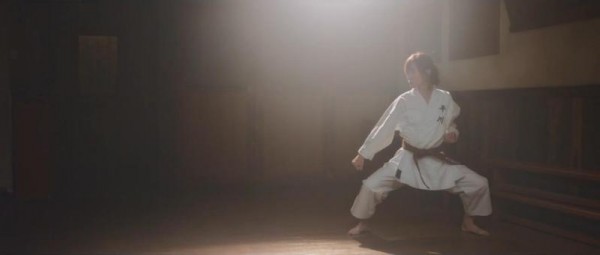
STEPHY TANG IN THE EMPTY HANDS
A girl can't be herself
In his second outing as a director, in which he also costars, Hong Kong actor Chapman To (Du Wenze) takes on the amusing and original tale of a young woman called Mari (Stephy Tang, in what has been heralded as a career-best performance) and her struggle to break away from the strict lifestyle of her Japanese karate master father (Kurata Yasuaki) after he suddenly dies. Here is female empowerment, accompanied by many droll as well as serious ironies.
Mari has had to grow up in a not-so-huge Hong Kong apartment that was mostly a karate dojo. Set design is one of this movie's special delights, particularly of the apartment, with its austere, zen dojo and the little, cramped living space it allows, a mass of crushed-together clutter. Daddy forced Mari to participate fully in his karate world, training and competing intensely, which she never liked, despite a gift for it. She finally quit, and they became estranged, while she snuck away frequently to enjoy a love affair with a married man, a radio DJ named Calvin (Ryan Lau). Then, when her father dies, Mari rejoices at the prospect of closing the dojo, whose business has dwindled lately anyway. She will live a free life, subdividing the well-located apartment into tiny apartments and living idly as a Hong Kong slumlord.
But that is not to be. Cue to lawyer-reading-the-will scene. Her father, it transpires, has left 51% of the dojo to a former student Mari can't even remember, the - to her - mysterious Chan Kent (Chapman To) a man who turns out to have just been released from prison. And so, to Mari's distress, Chan Kent comes to take over the running of the dojo with Mute Dog (Stephen Au), her father's main teacher, whose gruff ways she had hoped to be rid of. To make matters worse, Mari's boyfriend, Calvin, has just broken up with her. Her only comfort is her longtime friendship with buxom and down-to-earth BFF Peggy (Dada Chan), who works in a massage parlor with bj finales.
The movie unfolds all these complex details efficiently and entertainingly in the first half hour, including flashbacks to Mari's force-fed karate childhood, love-scenes with boyfriend Calvin, combative cuddles with Peggy, and noble, solitary karate workouts by Mari's chilly but distinguished-looking Japanese father, accompanied by the occasional splash of baroque music. Later an elegant flashback shows how Kent was rejected by Mari's dad for using karate selfishly, then got his several years' jail time for assault using it as he would like, to protect a little girl against a sexual predator. It is at this point, on his release, that he and Mari meet.
Then, when she makes her objection to life with him running the dojo clear, Chan Kent has a proposition: if she will enter a karate contest and simply remain standing, whether she wins or loses, he will sign off his part of the property to her and she'll never see him again. She does this, encountering a small but muscular and rough opponent who smashes her bloody. Many flashbacks - neatly done - show how her father's teachings have fortified her, though, and in the end she triumphs. The fight, despite all the cross-cutting, is very convincingly staged, Stephy Tang's karate chops convincing throughout.
Director To delivers a final sequence that neatly contrasts with this busy action. He takes a step that's so artistically valuable and so rare: he lets the film stop to breathe, with Mari alone in the dojo, having an imaginary dialogue with her father. As the film ends. nothing is decided, and we are left to contemplate its themes of rebellion, responsibility, and self defeat.
THE EMPTY HANDS / 空手道 Hung sau dou ("Karate"), 87 mins, opened theatrically 2 Nov. 2017 in Hong Kong, and in early Jan. 2018 in Taiwan; also was shown at Singapore May 2018. It was screened for this review as part of the New York Asian Film Festival, showing 6 Jul. 2018 at 8:15 p.m. Q&A with actress Stephy Tang, who will receive the Screen International Rising Star Award.
See Derek Elley's sino-savvy review on Sino-Cinema for further details, including the actual Chinese names of the actors, etc. Elizabeth Kerr wrote a review for Hollywood Reporter ("One of the strangest martial arts dramas ever made").

[SIZE] DESIGNER CLUTTER: MARI'S BEDROOM IN THE EMPTY HANDS.[/SIZE]
Last edited by Chris Knipp; 06-28-2018 at 07:51 AM.
-
THE RETURN (Malene Choi 2018)
MALENE CHOI: THE RETURN (2018)

THOMAS HWAN IN THE RETURN
Root canal
This quiet, haunting hybrid of documentary and fiction was made by Danish-Korean adoptee Marlene Choi in Korea and focused on the story of two thirtyish Danish Korean adoptees, Karoline (Karoline Sofie Lee) and Thomas (Danish TV actor Thomas Hwan), who come to Korea in search of their origins. Though feeling quite specific, they stand for many. As it turns out, since the Korean War in 1953 South Korea has been a major exporter of babies for adoption, over 200,00 having been raised mainly in Europe and the US.
Karoline arrives at Koroot, a group home specially provided for Korean adoptees. Here Karoline meets Thomas and other visiting Korean adoptees who come from America and communicate in English. A hunky young man from America tells a radical story. This is his second time in Korea. The first time, he immediately felt at home, so much so that when he left, it felt wrong. His adoptive parents objected to his exploration of his origins, and, given a choice between them and that, he has chosen to live in Korea. Like the others, he has not learned the language. Has he ever seen a Korean film? His decision is passionate, instinctive. It may be an emotional reaction to growing up feeling like an outsider. He has no idea what he is getting into but certainly here, he will look like he fits in. It's complicated. He has simplified it.
The visiting adoptees share experiences of being bullied in one way or another for being different, not being white. An older woman adoptee talks about her experiences of finding her biological parents and meeting them. When she met her father, she says she felt nothing. Only later she was very moved by the struggles of her mother, who became disabled relatively young, it turns out. She has returned to spend time with her mother.
Karoline goes to the Holt adoption agency, where the representative offers her little hope of finding out anything. Records were not kept, she says. Thomas says they lie, and offers to go back with her, as they do. Eventually it does emerge from help reading her Korean documents from the agency that she was born in a hospital on a small island off Inchon.
The truly profound scene is the one when Karoline and Thomas go to meet Thomas' biological mother, who has been found. They go with a female interpreter who translates back and forth between Korean and English. Thomas' mother is sweet, plying them with a meal prepared together in a small apartment. He was the result of a quick union with a boy who vanished, when she was very young. Her tale is of heartbreaking regret for having given up Thomas for adoption too hastily.She married, but never had children. All her life she has been haunted by longing to be with him. This quiet, underplayed scene is masterful in administering an emotional wallop with economical means. Realization that this sequence is staged, not "real," may undercut it, but not lessen its almost archetypal emotional power.
The use of staged elements for the framework narrative of the film allows Choi to experiment. The film uses innovative, subtle camerawork, editing, and sound to convey vividly the feeling of excitement and dislocation, of confusion and emotional dissonance Karoline and Thomas feel from first arrival. This helps to strengthen a very thought-provoking film that conveys as well as any movie yet what it is like to be adopted from a far-away country and long to understand and be reunited with one's origins. The writer, Sissel Dalsgaard Thomsen, has contributed substantially to giving the dialogue, particularly in Danish, a natural and specific feel.
The Return, 87 minS., debuted at Rotterdam and was reviewed by Screen Anarchy (Paige Lim) and Variety (Alissa Simon) at Göteborg Feb. 2018. Reviewed there for Variety by Alissa Simon .
Last edited by Chris Knipp; 07-16-2018 at 11:14 PM.
-
THE AGE OF BLOOD/YEOKMO - BANRANUI SIDAE (Kim Hong-sun 2018)
KIM HONG-SUN: THE AGE OF BLOOD/YEOOKMO - BANRANUI SIDAE (2017)
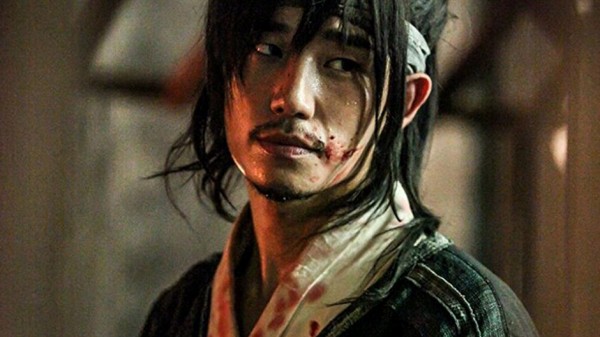
JUNG HAE-IN IN AGE OF BLOOD
Historical pleasures
This historical fight movie from Korea is big-time eye-candy built around new local heartthrob Jung Hae-in, usually a smiling and boyish type who looks great topless. It begins with a background review that's animated, and morphs seamlessly into stylized movie mode. Yes, this is about a historical event, though reinterpreted here. It concerns a rebellion. A lot of the fight action takes place at night; hence the sword and bow-and-arrow fights are depicted in extreme chiaroscuro that is frustrating if you want blow-by-blow detail but makes for artistic effects.
Jung Hae-in, who's thirty, has only been a name actor for four years, and thinks his fame won't last. (Maybe so, but he's enjoying himself for now.) He's known from TV series, a historical one, like this, called "The Three Musketeers," and a drama about three people who can foresee crimes, called "While You Were Sleeping." In civvies, Jung Hae-in has a slightly goofy look, like a surprised child. For Age of Blood he has been fitted with long, stylishly unruly tresses, a mustache, and chin whiskers. It makes all the difference. In this disguise, and various sharp period costumes, he sometimes looks dashing. He also looks goofy sometimes too.
In this movie, Yeongjo is the reigning ruler, 21st king of the Korean Joseon Dynasty. He is reputed to have poisoned his brother to become king. Kim Ho (the Jung Hae-in) is an ace swordsman who has been waiting around for an appointment for some time. When it finally comes, he's astonished to learn he's been demoted to the level of prison guard. Little does he know that this will be the most important place to be in the kingdom, and that the night of his arrival will be a decisive time. The prison is a dramatic setting, sometimes seen from above, it is a long one-story complex in a rectangular shape with a big central enclosed space. Kim Ho encounters various guards (he doesn't like the uniform; they mock him for boasting that he'll rise to senior guard quickly), and several unsavory prisoners.
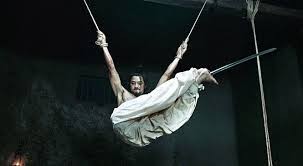
A striking interlude shows an unbelievably handsome, hunky, and sexy prisoner, nude to the waist in white and hung up by his hands, awaiting execution. Denied a drink of water in a cruel and mocking manner by a guard, he manages to break free, grab a sword, and execute the guard.
The main action begins when a group of conspirators break into the prison to set free their leader, who has been imprisoned, and Kim Ho takes them on. Joe Bendel, who has reviewed this film on JB Spins, adds more about the cast: "Hong Soo-a is also shows off some nice chops as Lady Yoo Seo-yeong, Kim Ho’s unexpected ally," and "Kim Ji-hoon’s Lee [the rebel leader] is arguably too cold-blood, but Jo Jae-yun is terrific as Do, the intense but honorable adversary." Kim Ho is arguably defending an illegitimate regime, established through a crime, but he is supporting the office, not the man. Anyway, all this, though entertaining and beautiful to look at, is only skin deep and shouldn't be judged too harshly as historical drama, even if that's what it it ostensibly is. There are discernible characters and there is a historical plot line, but the movie most notably exists as a stylish and polished excuse for a series of dashing battles and other displays of daring-do, with other visual pleasures thrown in.
The Age of Blood/ 역모 - 반란의 시대 Yeokmo - banranui sidae ("Conspiracy - The Age of Rebellion"), 102 mins., opened in Korean cinemas Nov. 2017, and debuted on Japanese TV May 2018. It was screened for this review as part of the 2018 New York Asian Film Festival, where it shows at 12:30 July 4th. It can be watched free on Amazon Prime.
A Korean movie blog in English, Drama Beans, provides a knowledgeable preview of this "gritty action sageuk [Korean historical period drama]."
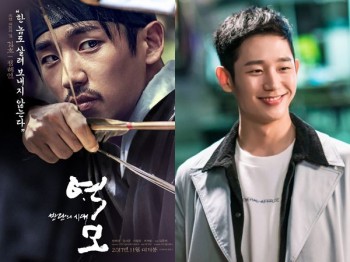
JUNG HAE-IN, IN AGE OF BLOOD AND IN CIVVIES
Last edited by Chris Knipp; 07-03-2018 at 09:49 AM.
-
THE SCYTHIAN LAMB (Daihachi Yoshida 2017)
DAIHACHI YOSHIDA: THE SCYTHIAN LAMB/HITSUJI NO KI (2017)
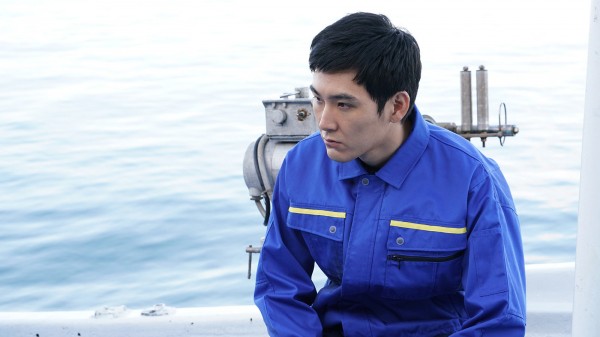
RYOHEI MATSUDA IN THE SCYTHIAN LAMB
Rich ingredients, small pot
The premise of The Scythian Lamb, based on the manga Hitsuji no ki originated by Tatsuhiko Yamagami and Mikio Igarashi, is almost too good to be true. The city government of Uobuka, a little Japanese seacoast town of declining population, decides to cooperate with the prison system, which is trying to reduce its numbers by releasing low-risk prisoners early, provided they stay in an assigned location for ten years. Uobuka gets six parolees at once, all convicted of murder. The possibilities are infinite. And this is the charm of Daihachi Yoshida's movie. As it unreels some of those and holds others in check, it avoids getting pinned down to any one genre. There is film noir, murder, romance, melodrama, thriller, suspense, and it's all laced with comedy. Rumors, which can't be verified, say that experiments like this actually have been carried out to help repopulate Japan's dwindling rural areas. It's doubtful there's been an all-murderer program, though.
At the center of things is a handsome and gentle young man who works for city hall called Hajime Tsukisue (pop singer Ryo Nishikido). Like any bureaucrat, he's stuck with executing an unappealing plan not at all of his devising. He must greet the new arrivals one by one, knowing only that they're ex-cons, at first, not their crime, and keep an eye on them thereafter. Nobody is to know who these people are, and they are not to know about each other.
The movie provides an opening series of vignettes in which Tsukisue greets the new arrivals one by one, takes them for a drive, and treats them to dinner - six get-acquainted sessions for him, and for us. Hiroki Fukimoto (Shinjo Mizusawa), to start, an angular, nervous type, very ill at ease, who gobbles up food and drink like Robinson Crusoe. Later he will get to work at the barber shop. Is he alcoholic? Yes.
Shinjiro Ono (Min Tanaka), even more angular, and ancient, is yakuza through and through, with a big scar down one side of his face. He doesn't warm to Tsukisue's "It's a nice town, with nice people, great seafood." But he scares away the gangsters that come to reenlist him. He thoroughly rejects his past life. And so, he's perfect for the dry cleaner's. Except his bad back isn't good for the ironing.
Equal opportunity, or sort of: two of the six are women. Both are pretty. One, Reiko (Yuka), goes to work at the senior center. Which is fine, except she and Tsukisue's father enter into a romantic attachment. The other, Kiyomi Kurimoto (Michiko Hichikawa) is sort of sweet, but also a bit dour and spooky. She gets assigned to a crew doing street cleanup. She likes to dig, and she likes to bury stuff. No worries.
There is one nice guy, Itchiro Miyakoshi (Ryuhei Matsuda). He has a positive attitude from arrival. He finds the seafood delicious. He looks and acts quite normal. Watch out!
And there's the snarky Sugiyama (Kazuki Kitamura, an actor whose resume includes Godzilla: Final Wars (2004), Kill Bill: Vol. 1 (2003) and The Raid 2 (2014). He's a provocative type, with a menacing, sleazy grin. It's clear from the get-go that going straight is not his intention. He's not only dangerous but wants you to know it. He goes to work down at the docks; he has nautical experience. He's looking for trouble - and other bad guys to join up with.
If Yoshida lingers over these intros, who can blame him? All the enjoyment of the characters doesn't get in the way of an exciting and suspenseful story-line.
Murderers are a diverse lot. Some kill by accident, others by necessity. (One of the ladies did kill an abusive husband.) Others kill by profession, or in their line of criminal work. Or in a unique fit of anger. Anybody might do it. It can happen by accident. Others do so out of overriding compulsion, and that's not an accident. All these categories are represented in the group. All of them are, by their pre-arranged jobs, inserted into the fabric of the community. It's a really small town.
Tsukisue, in a manga touch and a cool one, leads a sort of double life. In the daytime, his hair is combed back and he's always in a suit and tie. Off duty, he dons ragged jeans and T shirt, his hair flops over his eyes, and he's in a loud garage band. Clark Kent becomes a rock star.
The population grows by one without government help, when Aya (Fumino Kimura), Tsukisue's high school crush, returns to Uobuka. Tsukisue persuades her to join the band and play lead guitar, like in high school. There's a guy who plays drums. Guess who wants to learn guitar? Miyakoshi, the friendly, normal-seeming guy, who now drives a blue and yellow delivery truck.
The town has an ancient myth, and a giant bronze statue on a cliff to embody it: Nororo. Kids play around in a park one day stumbling like zombies, chanting "Nororo, Nororo!" - a neat way of introducing the theme. Nororo is a monster overlooking the sea. Legend has it that each year in olden times two men were thrown into the sea to appease Nororo's anger, and only one would survive. There is a Nororo festival every year today, with traditional costumes, and a young colleague of Tsukisue's, who has broken into their boss's computer and found out the identity of the new arrivals, unwisely arranges to have them all invited to participate in the Nororo festival. This makes for a dramatic and revelatory scene, with a dark night, a roiling sea, and men in white traditional costumes. But it's a photo of this in the newspaper that brings on the climactic sequence of events.
Daihachi Yoshida and his writer Masahito Kagawa have contrived an adaptation of their manga source that works - even if there are a few details that may make more sense in an earlier, larger context. The Scythian Lamb concludes with both a violent, suspenseful finale and a happy denouement. It's a delightful, interesting, very Japanese film, a compendium of different genres and moods happily blended in an atmospheric bouillabaisse. Nice town, Uobuka - nice people. Delicious seafood. But some of the fish have to be buried.
The Scythian Lamb / 羊の木 Hitsuji no Ki ("Sheep's tree"), 126 mins., debuted at Busan Oct. 2017, and has been included in five other festivals, including the 2018 New York Asian Film Festival, where it was screened for this review, and will show at 9:15 p.m. July 5.
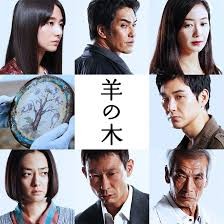
Last edited by Chris Knipp; 07-03-2018 at 11:43 PM.
-
THE BOLD, THE CORRUPT, AND THE BEAUTIFUL (Yang Ya-Che 2017)
YANG YA-CHE: THE BOLD, THE CORRUPT, AND THE BEAUTIFUL (2017)

KARA WAI, KE-XI WU AND VICKY CHEN IN THE BOLD, THE CORRUPT, AND THE BEAUTIFUL
Chinese gangster ladies in a gaudy-gorgeous Taiwan film
This Eighties family crime picture from Taiwan is gorgeous, lurid, and camp. On one level it is little more than highfalutin trash, soap opera with better production values. But with its multiple formats and lush mise-en-scčne, more often than not more visually complex than it needs to be, it's a delight to the eyes - whether one follows the complicated subplots from the history of Taiwan's political corruption or the mannered dialogue or not. Perhaps better not.
But what one can't miss is, this posh gangster family is female-only. The trio of leads, all juicy roles, are three generations of the Tang family. At center stage is Madame Tang, played by Kara Wai, in the midst of a late-career resurgence. While her cover is an antiques dealership, she really works full time to profit by questionable land speculation laws, cultivates corruptible politicians madly, acting as a go-between for them and dirty businessmen, and waging psychological warfare on any competition.
Madame Tang's daughter Ning (Wu Ke-xi) is her chief partner in crime, but also a liability due to her Valley-of-the-Dolls-style drug use as well as sexual overindulgence. This is lightly sketched in mostly with conversation, and her always having a cigarette in her hand and looking dreamy, but it's hinted that Ning is emotionally as well as morally damaged beyond repair by her mother's machinations. Chen-Chen (Vicky Chen, who's only fourteen, and who, like Kara Wai, got a Golden Horse award), the "innocent," doughty but slightly creepy girl in sailor-boy school uniform or puffy dresses, represents the third, youngest generation of Clan Tang.
There is a mind-boggling, but fun, opening series of multiple formats thrown at us, including a wall of TV screens showing different new stories pertaining to the principals and Taipei politics, then a TV studio set as cluttered and pretty as anything in a film by Apichatpong Weerasethakul, with an old lady plucking an antique stringed instrument and a man on the right chanting narration in traditional Taiwanese-Chinese dialect, as a framework of the main story. Then comes a fancy but tainted teatime for the grand and elegant Lady Wang (Chen Sha-Li), wife of a Speaker expected to become the top local politician. It's tainted by invasions from reporters, the daughter's odd behavior, and a costly gift that arrives with the hand broken off.
In anticipation of a major developed project, Madame Tang has guided her political associates to buy up parcels in an otherwise sleepy rural district, using shell companies.
Tea with Lady Wang is an over-elaborate but culturally nuanced mood-setter that would be worthy of a Godfather epic, were the filmmaking on a higher level and the plot richer. It shows, as Zhuo-Ning Su explains in his Film Stage review, that behind the "fake smiles, every word, gesture, look is code." Behind the elegant tea-time rituals, deals and bribes are being set up. Madame Tang speaks "Mandarin, Taiwanese, Japanese and her native Cantonese, which in itself fills in a lot of blanks with regard to her character’s back story, " Su notes, as well as indicating her level of ambition - information that provides a hint of how much the non-Taiwanese non-Chinese speaker may miss beyond the visual surfaces of this eye-candy movie.
A big plot complication comes, the next day, with the massacre in their home of local bank director Lin along with his entire family, except for young heiress Pien Pien, left in a coma. Conveniently, the chief suspect is a groom, now disappeared, who was having an affair with one of Lin's daughters. Other deaths turn up. This morphs into a murder case - yes, it's a little bit police procedural too - and brings out Madame Tang's criminal activities, a process leading to what Elizabeth Kerr in her Hollywood Reporter review calls "a wonderfully tragic, lurid, soapy reckoning." Actually the ending is a little weak and anticlimactic, however.
The summing-up by David D'Arcy in his Screen Daily review, "While grim, this story can also be wonderfully camp," is stating the obvious. This is at best a guilty pleasure, but one must give credit to the production crew and the actors and whoever thought up all the different visual formats to gild the overripe lily. Kudos to production designer Penny Pei-Ling Tsai and dp Ko-Chin Chen. Whatever its flaws, this movie leaves an impression.
The Bold, the Corrupt, and the Beautiful / 血觀音 Xuč guān yīn ("Blood guanyin [goddess]"), 112 mins., debuted at Busan Oct. 2017 and showed at Taipei, Rotterdam, Singapore, Seattle, and Buenos Aires, and was screened for this review as part of the New York Asian Film Festival, where it's showing July 5 at 2:15 p.m.
Last edited by Chris Knipp; 07-04-2018 at 10:17 PM.
 Posting Permissions
Posting Permissions
- You may not post new threads
- You may not post replies
- You may not post attachments
- You may not edit your posts
-
Forum Rules





 Reply With Quote
Reply With Quote










Bookmarks